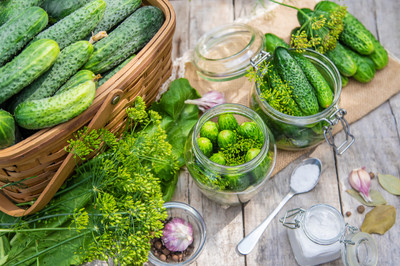Pickling Seasonal Vegetables In August
Posted by The Wares Team on 28th Aug 2019
When it feels as though several kilos of vegetables have ripened overnight in the vegetable garden, or the allotment is positively groaning with produce, the annual glut has arrived, make no mistake. All our hard work is paying off and we can be proud of our efforts and discipline in keeping the plot well-tended and watered throughout the growing season.
But it can also be quite alarming when you’re trying to cope with all that
produce and desperately trying to avoid anything going over or being wasted.
When you’ve eaten just about as many courgettes, broad beans and carrots as you
can cope with, it’s time to start thinking about pickling some of your produce,
so you can regain control and enjoy all that wholesome produce throughout the
year. So grab a batch of Kilner jars, because here come some of our favourite
pickling ideas.
Pickled Beans
There’s nothing worse than an old broad bean. Once they get to a certain size,
they become tough, woody and not very enjoyable to eat. Yet, they seem to grow
at an alarming rate, almost overnight. The secret to getting the best from this
crop is to harvest them young, and if you can’t eat the quantity you’ve grown,
then pickle some.
Make a standard pickling brine by boiling apple cider vinegar, water, sugar and
salt, and then pack a clean, sterilised glass jar or two with washed and
shelled broad beans, adding a sprinkle of mustard seeds, chilli flakes, crushed
garlic and chopped dill, pouring the brine over the top. Seal the jars and
store in the fridge for a few days to let the spices work their magic and then
the beans are ready to enjoy in salads, ploughmans or on their own as a tasty
snack.
Pickled Cucumbers
Cucumbers, and their smaller cousins, gherkins are another great candidate for
pickling and a glass jar of tasty cukes will always go down a treat at a family
barbecue or picnic. Again, if you have a glut of these, you need to act fast to
prevent them from growing too big, or going over. Always clean and sterilise
your Kilner jars before you start a pickling project and if you have them, the
larger Kilner jars with a wider opening are better for pickling cucumbers and
gherkins.
Slice your cukes and pack each glass jar with cucumber pieces, along with
peppercorns, sliced garlic cloves, sprigs of fresh dill and, if you like the
heat, slices of fresh horseradish. Pour vinegar, sugar and salt into a large
pan and add thyme and mustard seeds. Bring to the boil and then reduce the heat
and simmer for about 3-4 minutes. Pour the liquid over the cukes, ensuring
every bit is covered. Seal the jars, and label. Store the Kilner jars in a
cool, dark place and they’ll last throughout the winter.
Pickled Peppers
When Peter Piper picked a peck of pickled pepper, we don’t think it was chilli
peppers he was interested in, but they do pickle amazingly well. Since you only
ever need a small amount of chilli pepper for any recipe, unless you are a
complete heat freak, then you will always need to preserve your chilli pepper
harvest. A glass jar filled with an assortment of differently coloured pickled
chilli peppers looks fantastic and oh so appetising and will also make a great
homemade gift for friends and family.
The method for pickling chilli peppers is pretty much the same as for the other
vegetables we’ve covered already, using vinegar and salt. You can experiment
with the pickling spices you use for this project, but we have had great
success using cardamon, cloves, garlic, bay leaves, mustard seeds and more. If
your chilli peppers aren’t as hot as you’d hoped, you can always ratchet up the
heat a little by adding garlic and ginger to the pickling mix.
For chilli peppers, we make the pickling brine and then add the chilli peppers
to it, simmering gently for about 10 minutes, before transferring them to Kilner
jars and pouring the pickling brine over them. Sometimes we add some sliced
carrot to the mix, just for a little bit of variety in the jar. Again, make
sure that all the contents are completely covered with brine before sealing the
jars.
Have you got a vegetable glut at the moment? Runner beans running away from
you? Tomatoes tumbling from every plant? Carrots cracking along at a pace? How
are you dealing with it all? Whether you’re pickling, preserving, making
chutneys and relishes, or doing something else entirely with all that lovely
fresh veg, we’d love to hear about your experiences. Get in touch with us to
share your stories on Facebook, Instagram or Twitter - we’d love to hear from
you and see your photos.

